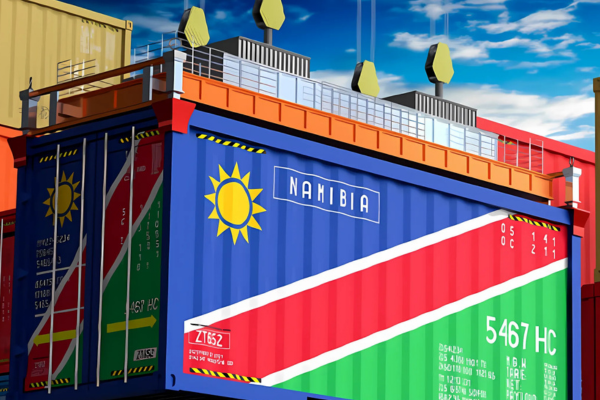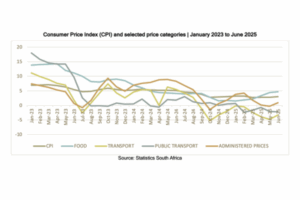Across Africa, trade unions are demanding a voice in trade policy development and the implementation of the African Continental Free Trade Agreement (AfCFTA). In Namibia, the Trade Union Congress of Namibia (TUCNA) secured a seat on the AfCFTA Implementation Committee. Mahongora Kavihuha, Secretary General of TUCNA, reflects on the struggle for inclusion, the importance of social dialogue in trade, and the union demands to make AfCFTA work for workers. This interview is part of a series promoting union action on trade and investment across the continent.

Mahongora Kavihuha, Secretary General of the Trade Union Congress of Namibia (TUCNA)
What have you learned from your trade and social dialogue experiences?
A key lesson from TUCNA’s experience with social dialogue is that stakeholders often do not fully understand the mandate of trade unions. It became clear when we first engaged officials at the Ministry of Trade and Industry that they did not realise that trade unions have a broad mandate, including macroeconomic and trade policy.
Our early engagements with the ministry were not easy. We had to make the political and technical case for the inclusion of trade unions in the AfCFTA National Implementation Committee, why labour provisions are essential in trade agreements, and why these provisions are distinct from issues such as the free movement of people. That effort paid off when the chief negotiator at the ministry acknowledged the value of our proposals and agreed that we need to work together to craft labour provisions.
From this experience, we have an advocacy approach that takes stakeholders to the basics. We clearly explain our union mandate and issues until they understand. We have successfully applied this approach with the Ministry of Trade, the Ministry of Finance, and the National Bank of Namibia. In each case, our goal has been to build understanding and alliances on trade unions, trade and the AfCFTA.
Treating every engagement as a political education is central to our strategy. It helped the Ministry of Trade and Industry realise the importance of including unions in discussions and ensuring that trade agreements have labour provisions that support decent work and social justice.
Is TUCNA or its affiliates involved in any formal or informal channels of social dialogue?
We are actively advocating for our inclusion in formal social dialogue mechanisms and have made progress. As part of our national advocacy, we held a high-level meeting with the Minister of Trade in Windhoek in November 2024, joined by ITUC-Africa. In that meeting, we made a case for the inclusion of trade unions in national structures implementing trade policy, including the AfCFTA National Implementation Committee. We cited examples such as the dedicated labour caucus at the AGOA summit to show that labour involvement in trade is both practical and precedented. Following sustained engagement, the Ministry of Trade agreed that TUCNA should submit names to serve on the National Implementation Committee. That agreement represents a significant step forward in recognising the trade union mandate in economic governance.
At the continental level, we are now calling on the AfCFTA Secretariat to ensure that every member state includes trade unions in their National Implementation Committees. Without organised labour, the implementation of the continental free trade agreement risks leaving workers behind. And that undermines the legitimacy of the free trade agreement and its long-term success.
Another area of focus for us has been the National Trade Forum, which currently includes only government and business. We proposed a tripartite structure, with trade unions as equal partners. TUCNA is also exploring sector-specific trade forums and strengthening the capacity of our affiliates to participate effectively.
To what extent can you influence trade policy and the AfCFTA?
Trade unions can impact trade policy, but access does not equate to power. Our persistent engagement with the Ministry of Trade has resulted in recognition of our role in trade policy and agreement on our participation in the National Implementation Committee. That only happened because we were clear, consistent, and politically strategic.
For our advocacy on the AfCFTA, we used our political connections and personal relationships to engage directly with the Minister of Trade. Once we secured political will, they brought in the technocrats. A 2021 study on the implications of the AfCFTA for trade unions in Namibia, supported by the Labour Research Service, strengthened our credibility and clarified our demands for the technocrats.
In Namibia, a small population means easier access, but that does not make the politics less real. We encountered challenges due to a lack of understanding of the roles of different ministries in trade agreements, such as the Ministry of Labour, Industrial Relations and Employment Creation, which did not see itself as part of the trade policy process.
Now that we have secured a place in the National Implementation Committee, we are asking the question: Will we use the space to influence, or will we become placeholders? This is a test for the trade unions negotiating international trade. Unions were left behind during earlier phases of the AfCFTA. We are now trying to catch the train and preparing ourselves to engage meaningfully. This moment requires serious capacity building across the sectors we organise, so that workers’ voices can shape the implementation of the AfCFTA.
What are the demands of TUCNA on the AfCFTA?
TUCNA has principled demands for what the AfCFTA should deliver for working people and their communities. We believe the demands must be reflected in both the labour protocol and in national implementation plans. The labour protocol must ensure that the AfCFTA does not reproduce the exclusions of past trade regimes. The protocol must support social justice in trade deals.
Inclusion in formal social dialogue mechanisms: Labour can and must be part of trade policy. Inclusion of unions in the National Implementation Committees must be the norm in all AfCFTA member states, backed by the Secretariat. We demand a seat at the table in every national, regional and continental forum shaping trade and investment.
Recognition of international and national labour standards: The AfCFTA must uphold ILO Convention 87 (freedom of association), ILO Convention 98 (right to organise and collective bargaining), and ILO Convention 155 (occupational health and safety).
Tax justice and social accountability: Social protection is linked to national wealth growth and redistribution. Without increasing revenues, protections will not improve. We demand a pro-employment national budget and support wage-led growth. We urge clear commitments within the AfCFTA framework for workers and the unemployed.
Focus on women and youth in trade: Labour provisions must address the struggles of women and youth in trade, particularly those in informal or cross-border trade.

ESSENTIAL RESOURCES
- Trade Unions and Trade: Assessing the possible impact of the AfCFTA in Namibia and the implications for trade unions in the country
- Namibia Trade Fact Sheet
- Trade union demands for the AfCFTA
- How to participate in AfCFTA National Implementation Committees
- What workers know, think, and feel about the AfCFTA
- Trade, Employment and Trade Unions in Africa: Some Policy Options.







